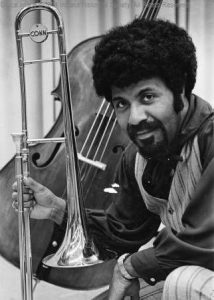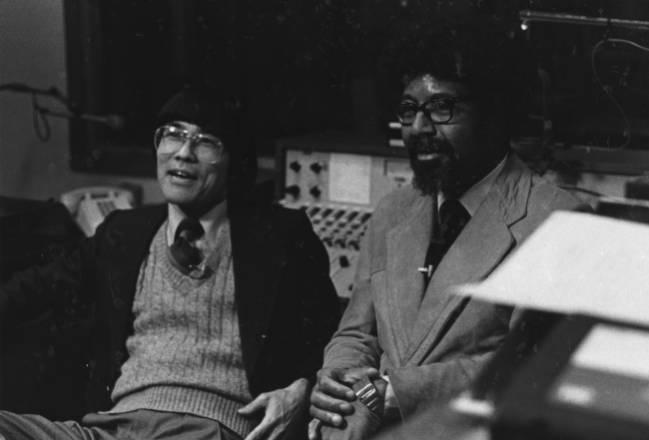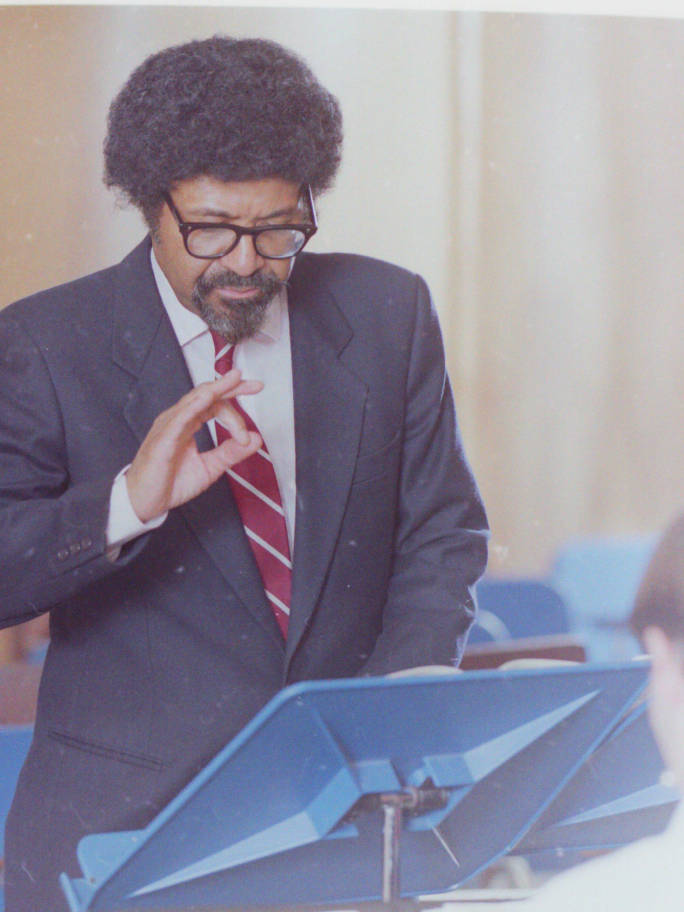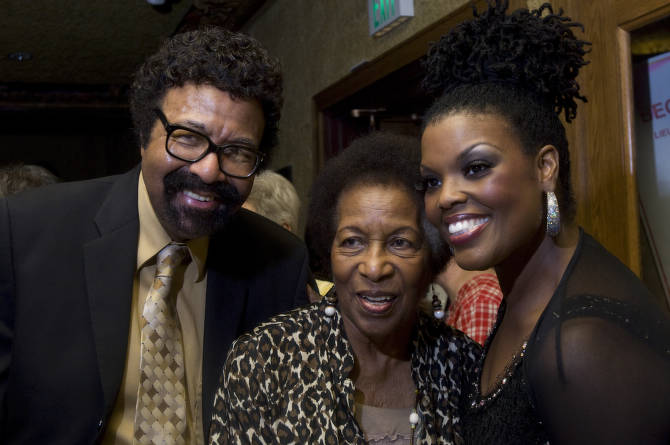
Photo info ...
Jazz musician David Baker, 1970 Credit: Indianapolis Recorder Collection, Indiana Historical Society View Source(Dec. 21, 1931 – Mar. 29, 2016). Born in Indianapolis, David Baker was an extraordinarily accomplished American jazz composer, conductor, musician, and professor who founded the Jazz Studies program at Indiana University Jacobs School of Music.
Baker grew up in Indianapolis, not far from the local jazz scene on . He attended and graduated from .
Too young to enter local clubs and the , Baker painted a mustache on his face using an eyebrow pencil to gain access to these venues, all the while praying it would not rain and reveal his disguise. Financially strapped, his ingenuity led him to make a tuba out of a cigar box, strings, and wooden rods. Baker listened to, learned from, and ultimately performed with great musicians such as . He in turn became a skilled musician, which earned him admission to Indiana University where he earned a bachelor’s and master’s degree in 1953 and 1954, respectively.

Baker’s aspiration to become a symphony musician was dashed early in his career. After auditioning for the , he was told he was probably the best musician who had auditioned but was not a viable candidate because he was Black. Indeed, few orchestras were open to Baker because of his race.
Undaunted, Baker found ways to continue his jazz career. But in 1953 when returning from a gig in northern Indiana the vehicle he was in was struck head-on by another vehicle. Seated in the front passenger seat, and asleep, Baker was thrown through the windshield and sustained severe injuries including a broken shoulder. It took hours to find a hospital to admit a Black patient, and doctors failed to take note of his injuries, which left a broken jaw undiagnosed for years. Unwittingly, Baker continued to play with his jawbone barely grown back together.

In the mid-1950s, Baker joined the music faculty at Lincoln University in Missouri, a historically Black college. In 1957, Baker married Eugenia Jones, a white opera singer. This union, a violation of Missouri’s anti-miscegenation laws, cost him his job so the couple moved to Chicago. Here Baker taught private lessons and performed with Chicago jazz legends.
In 1960, Baker toured Europe as an ensemble member of future Grammy winner Quincy Jones’ band. Though he continued to play into the early 1960s with the orchestras of George Russell, Lionel Hampton, Stan Kenton, and Maynard Ferguson, a chronic facial tremor resulting from his broken jaw ended his career as a trombonist. Unable to play the trombone, Baker returned to Indianapolis and picked up the cello. He became skilled enough to perform with his own group, David Baker’s 21st Century Bebop Band.
In the mid-1960s, he returned to academia. Though jazz as a musical genre was native to America, it was still considered a demeaning form of music, unsuitable for academic study. In fact, when a student, Baker was oftentimes rebuked for injecting jazz elements into his performances. But in 1966, Indiana University hired him to establish its Jazz Studies program, which he chaired from 1968 to 2013. Under Baker’s aegis, the program came to encompass the history, composition, and performance of the genre.
Baker excelled as a teacher and scholar. Numerous acclaimed jazz musicians studied with him, including Chris Botti, John Clayton, Peter Erskine, Shawn Pelton, and Pharez Whitted. Baker authored almost 400 articles and 70 books. Notably, “Jazz Styles and Analysis—Trombone: A History of the Jazz Trombone via Recorded Solos” (1973), “Jazz Improvisation” (1988), and “David Baker’s Jazz Pedagogy” (1989). Baker was named a Distinguished Professor at IU and a jazz composition scholarship was established in his honor.

Baker composed and produced more than 2,000 works. He composed jazz works and jazz-inflected concert music for instrumentalists and ensembles including violinists, cellists, the Beaux Arts Trio, the Audubon String Quartet, the New York Philharmonic, and the Fisk Jubilee Singers.
One of his most widely known compositions was Concertino for Cellular Phones and Orchestra (2006). Regarded as a post-modern commentary, Baker accepted a highly specific commission from the Chicago Sinfonietta, which allowed him to mock traditional prohibitions against cell phones at concerts. Baker engaged the audience members by requesting they sound their ring tones during the performance when signaled to do so.
Baker contributed much to the genre of jazz music and received many accolades. Baker played around the world, including Europe, Scandinavia, Australia, New Zealand, and Japan. He and Gunther Schuller were the original artistic directors of the Smithsonian Jazz Masterworks Orchestra, established in 1990. He was nominated for a Grammy and a Pulitzer Prize and was elected to the Jazz Education Hall of Fame. The National Endowment for the Arts honored him with the Jazz Masters Award in 2000. He received an Emmy for his score of a 2003 PBS documentary, For Gold and Glory, and the John F. Kennedy Center for the Performing Arts named him a Living Jazz Legend in 2007.
Baker is best known as one of the great educators of jazz music. He once called improvisation the sine qua non of jazz, acknowledging two great problems teaching the technique. First, either a musician has the talent to improvise or does not. Second, educators are either afraid or ignorant of teaching the technique. Before his death in 2016, Baker proved jazz improvisation could be taught and that teaching it can be learned. Baker’s legacy remains alive as Indiana University’s Jazz Studies program continues to be one of the most respected among dozens of academic jazz programs that flourish in the United States. In February 2022, IU honored the influential jazz artist and educator by renaming the Jordan Avenue extension, between 17th Street and Fee Lane in Bloomington, David Baker Avenue.
FURTHER READING
- Herzig, Monika. David Baker: A Legacy in Music. With Nathan Davis, J. B. Dyas, Willard Jenkins, et al. Indiana University Press, 2011. https://search.worldcat.org/en/title/769265999.
CITE THIS ENTRY
APA:
Verderame, J. A. (2021). David Nathaniel Baker. Encyclopedia of Indianapolis. Retrieved Feb 15, 2026, from https://indyencyclopedia.org/david-nathaniel-baker/.
MLA:
Verderame, Jyoti A. “David Nathaniel Baker.” Encyclopedia of Indianapolis, 2021, https://indyencyclopedia.org/david-nathaniel-baker/. Accessed 15 Feb 2026.
Chicago:
Verderame, Jyoti A. “David Nathaniel Baker.” Encyclopedia of Indianapolis, 2021. Accessed Feb 15, 2026. https://indyencyclopedia.org/david-nathaniel-baker/.

Help improve this entry
Contribute information, offer corrections, suggest images.
You can also recommend new entries related to this topic.